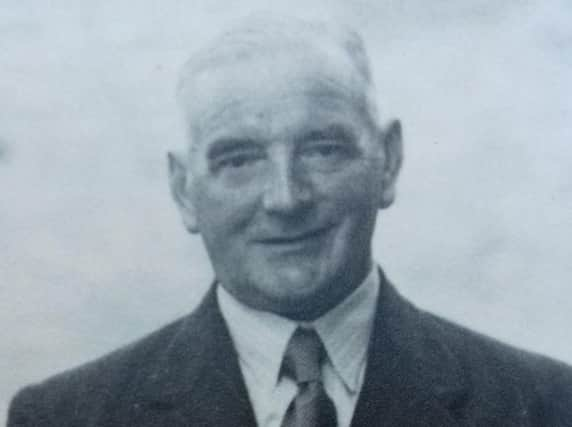Armistice Day 2018: Three Nidderdale brothers left for war, one did not return home


Joseph Carling, along with his brothers, George Edward and Richard Bolland Carling, from Pateley Bridge, fought across Europe during the First World War. Only two would return home once the guns fell silent, 100 years ago.
Richard, who served in the Canadian Expeditionary Force after emigrating to Winnipeg, was killed by shell fire in the trenches near Maple Corpse in 1916 and his death had a lasting impact on his family. Grand-niece, Anna McVittie, still remembers her father, William Arthur Carling McVittie, 'constantly missing' his favourite uncle, who he had grown close to as an only child.
Advertisement
Hide AdAdvertisement
Hide AdWhen Joseph returned home from the war, Anna said: "He came back a changed man, he had been in the thick of it. Three brothers had gone out, and one did not return return home."
The heart wrenching impact to families like Joseph’s should never be forgotten, Anna added: “I am 65 now, and there are probably few left who had relations who fought in the First World War. I don’t think we can appreciate peace, without these personal insights. Their stories hit you so much harder than reports you see on a television, when you know someone who lived through these events it has such a greater meaning.”
Joseph served as a Private in the 1st/5th Battalion of the West Yorkshire Regiment and was later promoted to an Acting Lance Corporal. He was sent to the Western Front in France on April, 16 1915, eventually joining the Royal Engineers as a sapper in the Chinese Labour Corps. Joseph would be promoted to a 2nd Lieutenant and was decorated for his service.
By sharing stories of her 'great uncle Joe’s' time in the war will Anna is also this year supporting the charity Brooke, who campaign to honour the millions of horses, donkeys and mules killed during the First World War.
Advertisement
Hide AdAdvertisement
Hide AdShe still remembers the ‘tears coming to his eyes’ when he would credit two mules with saving his life whilst serving in France. The animals, which were used by military forces to transport munitions, food, mail and even causalities, refused to move after a long journey. It meant Joseph and another soldier were a safe distance from a troop transport, when it suddenly exploded, killing all of the soldiers inside.“
Anna said said: "“After walking a long way in the great heat, the mules stopped dead and would not budge a step further. Uncle Joe and his fellow soldier were hot and tired, and not amused that the mules literally dug their hooves in. They pushed, pulled, and shouted. Whilst they were still standing there feeling desperate, a military vehicle came towards them from the other direction. Suddenly it exploded, bursting into flames, and all travelling in it were killed outright.
"My great uncle and his pal burst into tears and hugged and kissed the two mules, flinging their arms around their necks, weeping into their manes. Had the mules not stopped, they themselves would have walked over that very spot and been killed.”
Remembering her visits to Pateley Bridge as a child to visit Joseph she added: : "He would always speak in a very emotional way, as if he could never forget what those two animals did for him and his friend. The tears come to my eyes, just thinking what a mementos event it was."
Advertisement
Hide AdAdvertisement
Hide AdAnna gave thanks to the hard work of researchers at the AONB's WW1 Project for Nidderdale, which began in 2013 and researches the lives of 2,500 men and woman from across the Dales during the war. Thanks to them she was provided a detail transcription of Joseph and his brothers' service during the Great War.
These records are all the more precious when considering around 60 per cent of WW1 service records were destroyed in bombing raids during the Second World War. The group currently has a display of its findings at Nidderdale Museum, until the end of November.
Records
Because of these documents we know that Joseph was officially demobbed on January, 25 1919 and would return to his home at Bank House on the High Street of Pateley Bridge. Anna still has silver cup which was presented by the residents of the town, in recognition of his services.
His brother George would be awarded the British War Medal and Allied Victory Medal for his service during the war. He died in 1956, aged 72.
Advertisement
Hide AdAdvertisement
Hide AdRichard emigrated to Canada when he was 27 years old and is recorded as working as a farmer. He enlisted on December, 24, 1914 in Winnepeg Canada, serving as a Private in the 8th or 32nd Battalion of the Canadian Infantry (Manitoba Regiment). His Battalion joined the Canadian Expeditionary Force and was sent to the Western Front in Europe.
He is recorded as having been killed in action on Wednesday June, 14, 1916. As his body could not be recovered, he is remembered with honour on Panel No’s. 24-26-28-30, Yepres (Menin Gate) Memorial, in Belgium.
Richard would be posthumously awarded the British War Medal and the Allied Victory Medal.
Joseph, and his brothers, are today remembered on the Pateley Bridge and Bewerley War Memorial in the Recreation Ground.